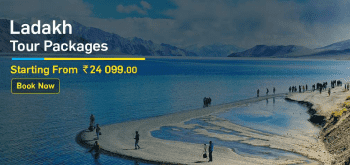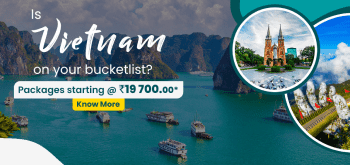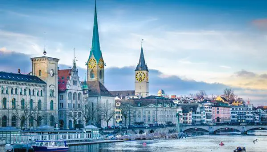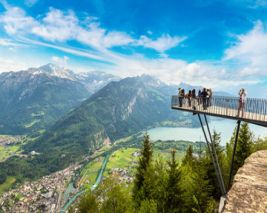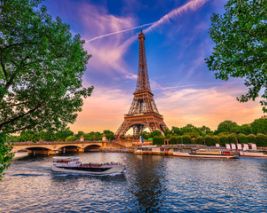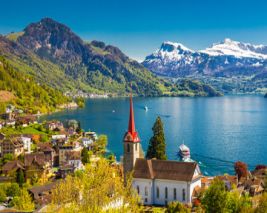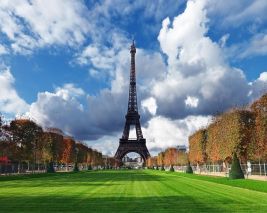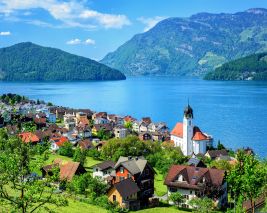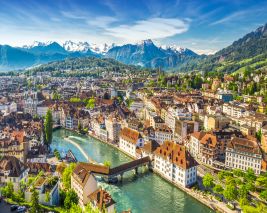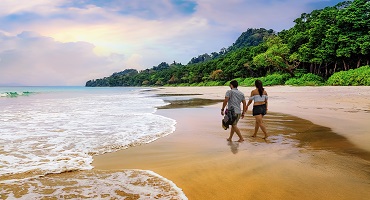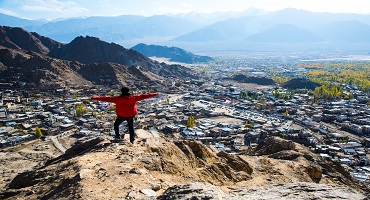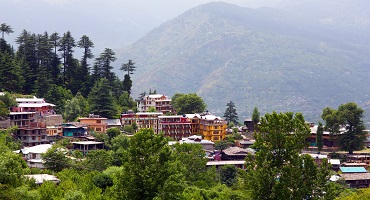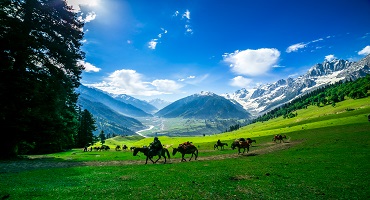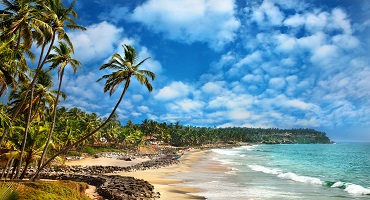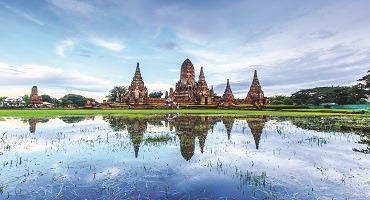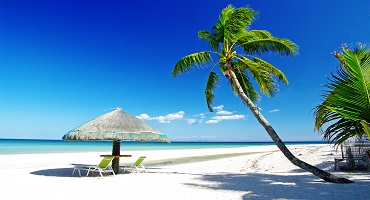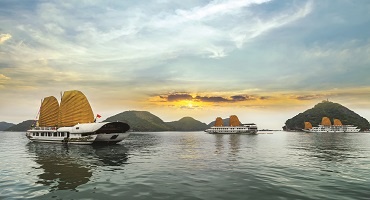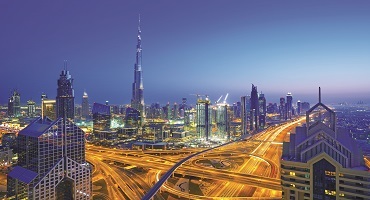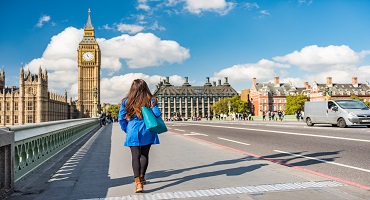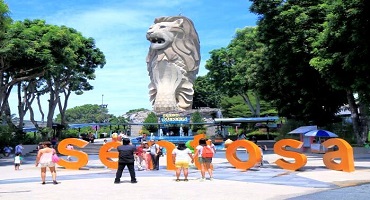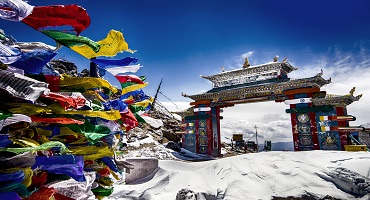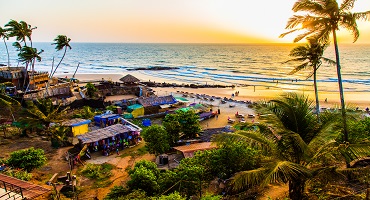Switzerland conjures images of snowcapped peaks, glacial lakes and quaint mountainside villages. Of the finer things in life like exquisite craftsmanship and creations from chocolates to watches. It is a place synonymous with peace and stability. Sitting in the heart of Central Europe, it shares borders with five of the continent’s wonderful and unique countries — France, Germany, Italy, Austria and Liechtenstein. All of this combined puts Switzerland tourism high on almost every tra-veller’s bucket-list. Venture into the land of the majestic Alps, of glorious cities and picturesque rural life, of castles and old town squares, of the most beautiful blend of European influences. For this is not an experience that should be simply be seen in photographs or the movies, it is one to be had.
|
Swirzerland Tourism: A Quick Overview
|
|
Continent
|
Europe
|
|
Official Languages
|
French, Italian, German & Romansh
|
|
Dial Code
|
+41
|
|
Population
|
8.59 Million (As of 2019)
|
|
Currency
|
Swiss Franc (CHF)
|
|
Time Zone
|
UTC+1
|
|
Area
|
41,285km²
|
Highlights of Switzerland
Switzerland tourism offers unique opportunities to explore the grandeur of the country. Here are some highlights of Switzerland tourism that you can explore with experienced Switzerland travel guides:
Majestic Alpine landscapes -
Switzerland is home to iconic peaks such as the Matterhorn and Jungfrau. The Swiss Alps provide unparalleled opportunities for skiing, hiking and mountaineering at the renowned places to visit Switzerland.
Scenic train journeys -
Apart from exploring with Switzerland tour guides, you can experience panoramic vistas.Aboard trains such as the Glacier Express and Bernina Express.
Historic Cities -
Switzerland travel guides can also show you how to explore cities such as Zurich, Geneva and Bern. Each of these cities in Switzerland tourism offers a unique blend of historic landmarks, museums and vibrant cultural scenes.
Lakes and waterways -
Apart from the tourist spots listed in Switzerland, tourist guides, the country also boasts pristine lakes such as Lake Geneva and Lake Lucerne which are perfect for boat cruises and waterside relaxation.
Culinary delights -
One of the major attractions of Switzerland tourism is indulging in Swiss specialities such as fondue, raclette and world-renowned chocolates.Reflecting the country's rich gastronomic traditions.
Now, let’s explore these highlights of Switzerland travel guides in detail.
Cities
Zurich - Switzerland’s largest city resides on the banks of the picturesque Lake Zurich, at the base of the Alps. With such a scenic spot to call home, it’s little wonder this lively city is surrounded by beautiful vistas. Get close to nature by boating on the lake or hiking up Utliberg Mountain. Immerse yourself in art and culture, with the over 50 museums and 100 galleries all over town. Experience world-class dining and nightlife at the countless restaurants and clubs. Zurich really lets you fulfill every holiday fantasy.
Geneva - A centre for arts, culture and humanitarian efforts, Geneva is another of Switzerland’s main desti-nations. Apart from the lovely Lake Geneva and its fabulous fountain, the city boasts an indulgent side with its many elegant monuments, museums, galleries, hotels, boutiques, theatres, operas and restaurants that all exude a sense of luxe. From sightseeing to shopping to sipping on fine be-verages, Geneva will treat you in ways you can’t imagine.
Bern - The capital city of Switzerland, Bern is set along the shores of the pristine Aare River and has a wonderfully intact old town that instantly transports the mind to a bygone era. Those sandstone buildings, cobbled paths and arcades and juxtaposed by amazing modern bars, clubs and restau-rants, making this a really balanced modern city to explore.
St. Moritz - St. Moritz is like a painting — one of the most pristine regions in the country, with fresh air, lake views and picturesque hamlets all across the countryside. There are plenty of exclusive stays here, allowing you to spend luxurious moments soaking it all in. The surrounding mountains can also be explored with plenty of mapped treks and trails.
Shopping At Switzerland
Any holiday shopping in Switzerland is defined by craftsmanship and exclusivity, whether it be watches, chocolates, cheese, apparel or traditional handicrafts. Zürich offers some great shopping venues like the world-renowned Maurice de Mauriac watch store, the Bahnhofstrasse 31 shopping arcade with every kind of store imaginable, vintage clothing store, Scotch and Soda, as well as the Negozio Lindt Chocolate Factory to satisfy your sweet tooth. For those visiting Geneva, the wine and cheese are worth a place in your suitcase. Swiss Army Knives, cuckoo clocks, cow bells and music boxes are popular local souvenirs found across the country.
Let’s break down the shopping destinations by preferences as per Switzerland travel guides:
For luxury goods -
Top places to visit Switzerland like Zurich and Geneva are famed for high-end shopping districts. You can visit the areas of Bahnhofstrasse and Rue du Rhone Where you can find featured products by international designers and Swiss watchmakers.
Local markets -
On your Switzerland tourism, don't forget to explore the local markets in cities like Bern and Lucerne for handcrafted goods, artisanal foods and unique souvenirs to commemorate your trip.
Chocolate and cheese shops -
Switzerland tourism is not complete without sampling and purchasing the renowned Swiss chocolates and cheeses from speciality stores found throughout the country.
From how to reach Switzerland to identifying the best places to visit Switzerland is made easier with the help of Switzerland tour guides. You can also use Switzerland travel guidebooks and brochures to find the ideal shopping areas and things to do.
Activities In Switzerland
The amazing thing about Switzerland is that it can satisfy your wanderlust no matter where it leads you. Mountains like Mt. Titlis, Mt. Pilatus, Jungfraujoch and Mt. Rigi are the most popular, offering a plethora of outdoor activities, from scenic train rides to trekking trails to skiing. Mean-while, the cities enthral with their lively ambience, spectacular culinary and nightlife culture, shopping, leisurely lakes and parks and grand old monuments to explore. Other must-have expe-riences include visiting the country’s luxurious spas and sampling delicious fondue.
Cuisine Of Switzerland
Expect a whole lot more than simply continental cuisine, here in Switzerland. The country is known for its fine wines, cheeses and chocolates, but there’s also an incredible fine-dining, café and pub culture in every region or city. Culinary tours offer a chance to sample a variety of preparations, or you could visit some of the top restaurants across the country including - Haus Hiltl in Zurich, Brasserie Anker in Bern and Café du Soleil in Geneva.
Interesting facts about Switzerland
Switzerland is only about twice the size of New Jersey, yet homes 208 mountains — 65% of its total land mass is covered under the Alps.
- There are more than 1500 lakes and 1000 glaciers in the country.
- Some of the world’s most famous inventions are Swiss, including the Swiss Army Knife, Velcro, Cellophane and milk chocolate.
- Research shows that Switzerland consumes more chocolate than any other country.
- Switzerland is widely regarded as one of the happiest places to live in the world.
- Albert Einstein invented his famous formula, E=MC2, while in Switzerland.
- Indian films are produced in Switzerland more than any other country.
- Famous Swiss personalities include tennis superstar Roger Federer, acclaimed artist H.R. Giger, iconic psychologist Carl Jung and founder of Chevrolet car company, Louis-Joseph Chevrolet.
Location Of Switzerland
Switzerland is a landlocked country in West and Central Europe, surrounded by France to its west, Italy to its south, Germany to the north and Austria and Liechtenstein to the east. The Alps run through the south and south-east region, with the Swiss Plateau to its north and the Jura Moun-tains further beyond. The Swiss border with Germany follows the River Rhine, which flows into the country near Schaffhausen. Part of the borders with Germany and Austria are drawn through Lake Constance, and Lake Geneva with France.
Best time to visit Switzerland
The class and beauty of Switzerland can be experienced all through the year. But different seasons can be more favourable for certain activities and regions. Generally, the spring and summer months from April to August is considered the best time to visit the country, as the winter chill subsides to reveal bask-worthy sunshine, a blossoming countryside with endless meadows, lakes and trails to explore. Meanwhile, for snow enthusiasts, there are perennially snow covered peaks with ski resorts and lodges aplenty. With perfect outdoor weather, the many cities, festivals and activities are at their bustling best, truly making this the ideal time to plan your trip.
Let’s break down the best time to visit Switzerland for a clearer picture:
Spring (April to June) -
This is the best time to visit Switzerland if you enjoy mild weather and blooming landscapes, perfect for sightseeing and outdoor activities. During this period, Switzerland tourism sees fewer tourists, thus you can also expect accommodation and other facilities on a budget.
Summer (July to August) -
If you are not a fan of the cold but want to enjoy hiking, lake activities and attending festivals, this is the best time to visit Switzerland. You can expect warmer temperatures and larger crowds, Especially in tourist areas, but it is perfect to meet like-minded people and share your interests in Switzerland tourism.
Autumn (September to October) -
If you wish to enjoy a pleasant climate with fewer tourists bustling around the streets, this is the best time to visit Switzerland. You can hire Switzerland tour guides to escort you on hiking trips to witness the vibrant fall colours.
Winter (December to March) -
This is the best time to visit Switzerland if you want to partake in skiing and snowboarding. Switzerland Tourism offers world-class winter sports in Alpine regions during this time.
Identifying the best time to visit Switzerland will help you explore the country’s many offerings with or without Switzerland travel guides.
How to Reach Switzerland
By Air - Flying to Switzerland is the quickest most sensible way to reach the destination, with Zurich Airport being the main international terminal. There are direct flights available from Mumbai and New Delhi to Zurich, with indirect flights from most other major cities like Kochi, Bengaluru and Chennai. Swiss Air is the national carrier, while others offering flights to Switzerland include Emi-rates, Eithad, Air France, Lufthansa and Air India — your choice of airline will determine the layo-ver. Zurich has amazing connectivity with all parts of the country, with road, rail and flight services available at the airport itself to take you to your final destination in the country.
By Rail - Since Switzerland shares its borders with five different European countries, you can easily enter via the rail network. High-speed railways run between all major cities on the continent and the various regions of Switzerland. While you will still need to fly into Europe, once you’re here, the scenic and efficient Euro rail services make one of the best ways to arrive into the country. You could also opt for a Eurail Pass as it allows unlimited train access across 31 countries.
By Road - Similar to the railways, there’s an immense network of motorways connecting Switzerland to all parts of Europe. Driving in, taking a long-distance taxi or inter-country bus services are all great ways to make a road trip into Switzerland, offering stunning views every second of the way. Some of the roads can get quite mountainous, so caution is advised.
Once you choose your best mode of transport for how to reach Switzerland, you can also use the efficient railway network that connects major cities for convenience. You can easily reach places to visit Switzerland with these modes of how to reach Switzerland. You can check the timings of these transports in Switzerland travel guides.
History Of Switzerland
The earliest inhabitants of the regions that make up current-day Switzerland were the Helvetians of Helvetic Celts. By about the 1st Century BC, the land fell under Roman rule and began to flou-rish. Cities were formed, commerce thrived and military presence was strong.
After the decline of the Roman Empire, a period of invasions by Germanic tribes followed, taking over large territories. By year 800 AD, the country became part of the empire of Charlemagne and eventually a dominion of the Holy Roman emperors. But soon after, their power began to recede and a historic charter was signed by the ruling families on 1st August 1291, that stated the land was to be under autonomous administrative and judicial rule. The date is now celebrated as Switzerland’s National Day.
In the centuries to follow, the Swiss Confederates continued to suppress harsh takeovers while slowly expanding its boundaries. While at the same time, they remained notably neutral during the wars taking place around Europe. By the 19th Century, Switzerland began to rapidly develop and historically managed to maintain its neutrality during the two World Wars which ultimately led to its increased role during the Cold War as a diplomatic nation, with the UN headquarters set in Geneva, alongside its many specialised agencies.


